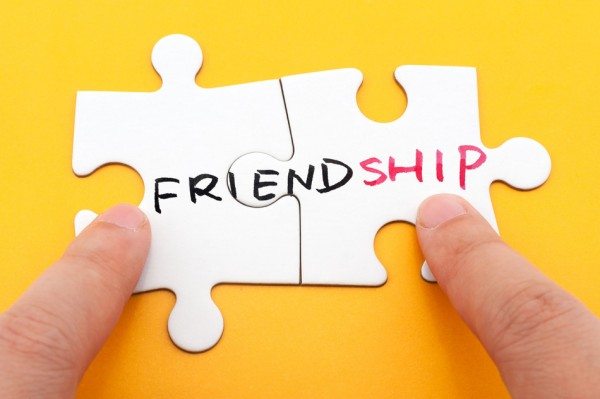
Friendship Rules for the Big Kids
I miss the days of sandbox politics. Sure, at the time, it seemed like nothing could hurt more than watching my daughter try to figure out why Sally had decided to be BFFs with the mean girl just because she had a shiny purple bucket, or seeing my son’s bewilderment when his exuberant sand-tossing resulted in the anger of the rest of the kids sharing his space. But you know what they say… little kids, little problems. Big kids, big problems.
Or—as it feels ’round here, of late—big kids, big heartache.
The rules of engagement seemed easier when the kids were little. Be kind. Don’t exclude anyone. No one should make you feel bad. Those rules still apply, but everything seems so much more complicated, now.
I try to remember that the very best piece of advice I’ve ever gotten about parenting teens is this: Listen more than you talk. This is hard for me. I mean, I think I’m a decent listener, but I do love to talk. I have many things to say! Lessons to impart! Wordy wisdom gleaned through years of hardship I could surely save my offspring from if only they would listen to my many thoughts. (Yep, don’t worry. I feel just as ridiculous reading that, now, as it sounds.)
So I try to keep the advice short. I listen, and sympathize, and try to urge my children to make hard choices without talking their ears off or somehow acting like it’s easy, because it’s anything but.
Be kind is still a biggie. Always. You can’t control other people, but you can control yourself. There is never a need to engage in poor behavior, no matter how crappy someone else has behaved towards you. At the end of the day, can you hold your head up when you review your own actions?
When you’ve done wrong, you need to make it right. We all make mistakes. What matters is what you do after; can you own your choices and apologize (and make changes) when necessary? Are you constantly dealing with someone who has no idea how to say they’re sorry?
No one can make you feel bad without your permission. Sometimes people aren’t their best selves. Sometimes people are thoughtless (and teenagers tend to be self-absorbed by design; it’s developmentally-appropriate, but still hard), and sometimes people are downright mean. But when you are feeling hurt over someone else’s actions, that can often be mitigated by remembering that other people’s bad behavior is almost always more about them than it is about you.
Decode the messages that are clouded by emotion. Sometimes a friend treats you poorly because they’re upset about something and they don’t know how to tell you. Instead of saying, “I wish you were spending more time with me than with your boyfriend and I miss you,” she says, “Your boyfriend is stupid and I hate him.” Before you give in to the knee-jerk reaction of anger and defensiveness, stop to think about why a friend might say something like that. Is it because she has a genuine concern about the way you’re being treated? Or is it because she’s hurting and doesn’t know how to say so? Is it simply jealousy and immaturity? Look for the message, even if the delivery is less than ideal.
Learn to float through social spaces. I’m not a huge fan of expending energy on socializing that doesn’t really feed your soul (introverts, holla!), but at the same time, life in general (and high school in particular) is a lot more pleasant when you can “make nice” in a variety of situations. It’s not about being fake, it’s about realizing that there’s a huge middle ground between friends and enemies, and the majority of your day-to-day interactions should dwell in that space—be pleasant (or be quiet, if you can’t) because that’s just part of being a decent human being. There’s no need to get involved in drama or disagreements with people who aren’t part of your support system. Save your energy for the good stuff, and remind yourself that you’re Switzerland if you find yourself tempted to get involved in something that shouldn’t matter to you.
Be compassionate without being a doormat. It’s one thing to try to understand the motivation and message behind hurtful behavior, it’s another to endure abuse. Friends are kind to each other more often than not, and if you find yourself in a relationship where you feel bad about yourself most of the time, have some compassion for yourself and move on to healthier interactions with people who lift you up rather than tear you down. You can sympathize with a friend’s emotions without tolerating continual hurtful behavior.
Pick your battles. Not every disagreement merits a confrontation. Conversely, avoiding confrontation at all costs could mean selling yourself short. Some irritations can be shrugged off; some problems need to be addressed no matter how uncomfortable if you plan to stay friends. Figuring out which is which is the tricky part. Maybe an otherwise good friend always tells you terrible jokes you hate… that’s something you can just roll your eyes at, probably. But when a friend is always putting you down, well, it’s either time to have a frank conversation and create some changes or walk away. Either way, a problem should be addressed or dismissed. No one benefits from simmering in rage about something. Either it’s a big deal and you bring it up, or it’s not a big deal and you need to get over it and move on.
Now, if only I could figure out how to imprint all of this on my teenagers’ brains in some sort of indelible fashion with just a meaningful quirk of my eyebrows. I don’t think that’s too much to ask, do you?

